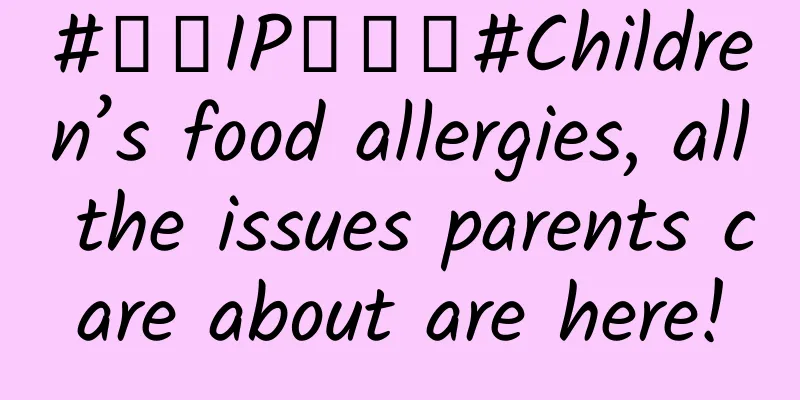#千万IP创科普#Children’s food allergies, all the issues parents care about are here!

|
What is a food allergy? Food allergy refers to adverse health effects caused by an abnormal response of the immune system when a child is exposed to a specific food. This response may be IgE-mediated, non-IgE-mediated, or a mixture of both. What are the types of food allergies? 1. IgE-mediated food allergy IgE-mediated food allergy: rapid reaction, may include acute urticaria, angioedema, etc. 2. Non-IgE-mediated food allergy Non-IgE-mediated food allergy: The reaction is slower, mostly gastrointestinal symptoms. 3. Mixed-mediated food allergy Mixed food allergy: has characteristics of both IgE-mediated and non-IgE-mediated food allergies. How are food allergies diagnosed? Skin prick test (SPT): It has diagnostic value for IgE-mediated food allergy, but it cannot be used as the sole basis for diagnosis. Specific IgE (sIgE) testing: It has clear value for IgE-mediated food allergies, but it cannot be used as the sole basis for diagnosis. Oral food challenge test (OFC): It is the most reliable clinical diagnostic method, among which the double-blind placebo-controlled food challenge test (DBPCFC) is the gold standard for diagnosing food allergy. How are food allergies treated? Reasonable dietary avoidance: Avoiding foods that are clearly allergic is the main treatment method. First aid for severe allergic reactions: Intramuscular epinephrine is the first-line treatment. Can food allergies be prevented? Breastfeeding: There is currently no definitive evidence that exclusive breastfeeding can prevent food allergies. Dietary adjustments for mothers during pregnancy and lactation: Restricting the intake of potential food allergens by mothers during pregnancy or lactation in order to avoid food allergies in infants and young children is not supported. Hydrolyzed protein formula: There is insufficient evidence to support its role in preventing food allergies in infants and young children. What is the prognosis for food allergy? IgE-mediated food allergies: such as milk, eggs, soy, wheat, etc., may develop a certain degree of tolerance with age. Non-IgE-mediated food allergy: tolerance is more likely to develop earlier. What should parents do? Seek medical attention promptly: If you suspect your child has a food allergy, you should seek medical attention for diagnosis. Follow doctor's advice: Follow your doctor's advice on diet and treatment. Regular follow-up: Regularly evaluate the child’s allergy status so that the treatment plan can be adjusted in time. |
<<: Silver Age Health丨How can the elderly protect their knee joint health?
Recommend
When this type of cancer is discovered, it is usually already in the late stage! In fact, your body has already given you a warning...
Expert of this article: Wang Qian, attending phys...
How to store grapefruit? Is the flesh of grapefruit white or red?
For white grapefruit, its peel is generally golde...
How can women replenish their body the fastest?
It is not uncommon for women to suffer from qi de...
Can you eat apples to lose weight during menstruation? Here are 7 steps to help you
I believe everyone knows that eating an apple eve...
Why do my lower bones hurt during pregnancy? Is the pain in my lower abdomen in late pregnancy due to pelvic floor?
It is not easy to be pregnant for ten months. As ...
Have you ever felt sleepy since you just got pregnant?
After the embryo implants, it means that the woma...
Can you bake by making popcorn butter? Why do girls like baking?
BP is called baking powder in baking. Baking powd...
Can pregnant women take compound ferrous sulfate and folic acid tablets?
I often hear many people with iron deficiency ane...
What is the best oil to use for boiled fish? What is the detailed method of boiled fish?
Modern people like to eat boiled fish very much. ...
What causes fetal neck twisting?
Fetal umbilical cord around the neck means that t...
Is it normal for leucorrhea to be milky white and have no odor?
Leucorrhea is a common secretion among female fri...
14 years old and no menstruation for two months
What is the reason why a 14-year-old girl has not...
Can pregnant women eat yam?
For pregnant women, they should eat foods rich in...
Why can white pimples be squeezed out of the nipple?
Sometimes you may find that white acne-like subst...
How much does a pregnancy test cost?
After a woman becomes pregnant, she needs to do d...









